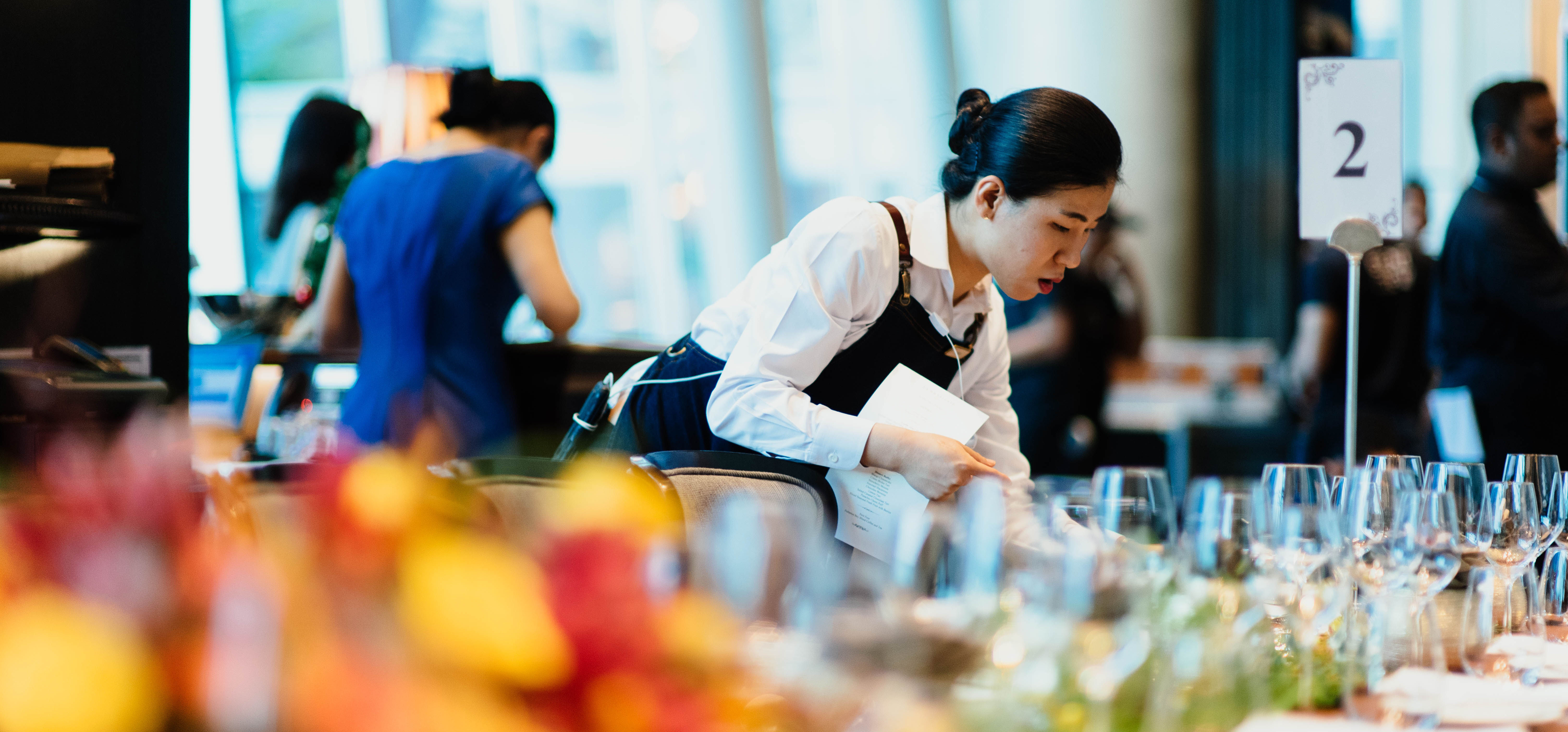Omotenashi: Japanese Hospitality and Corporate Events
Corporate events in Japan are different to those hosted in Europe or America. Japanese hospitality culture is founded on an ancient philosophy known as omotenashi. Omotenashi defines how Japanese people interact in public spaces, at work and in social situations. Recognizing omotenashi in action can teach you how to be a better host and how to organize corporate events that are motivational and memorable.

What Does Omotenashi Mean?
Like other culture-specific words such as waldeinsamkeit (German for feeling alone yet deeply connected to nature in the woods) or forelsket (Norwegian for the excitement of falling in love), omotenashi doesn’t have a direct translation. The simplest way to define omotenashi is “the Japanese concept of selfless and wholehearted hospitality.”
The Japanese term ‘omote’ comes from the notion of ‘omote-ura-nashi’. ‘Omote’ and ‘ura’ are important Japanese concepts that can be understood as the ‘public’ and ‘private’ face. ‘Nashi’ means something that does not exist; nothing. In full, ‘omote-ura-nashi’ means having neither a public nor a private face, ‘no front or back’. In this sense, we can understand omotenashi as hospitality that hides nothing, that is open-hearted and pure.
The origins of omotenashi can be traced back many years before corporate events to ancient Japanese tea ceremonies. First introduced to Japan by China in the 8th century, tea ceremonies follow basic Buddhist principles. Known by the names sadō, chadō, or chanoyu, tea ceremonies are solemn rituals. Tea master of the 16th century Sen no Rikyu taught his disciples appreciation for simplicity, shared humility and a connection with the natural world. When practicing Japanese hospitality during a tea ceremony, the tea master serves their guests without being servile. Anticipating the needs of guests is done in the spirit of harmony, not hierarchy. And central to it all is a pure heart.

So how does omotenashi stand up in the 21st century? Very well it seems, as omotenashi became the buzzword for the Tokyo 2020 Olympics campaign in 2013. Bid ambassador Christel Takigawa explicitly named Japanese hospitality culture as one of the main reasons the world should consider Tokyo in 2020. Her speech did the trick and Tokyo’s hosting bid was successful.
Japan hopes to welcome upwards of 40 million foreign visitors this year to experience their Japanese hospitality and corporate events first-hand. Before Tokyo is subjected to the sporting world’s spotlight, it’s worth learning how to spot omotenashi in practice.
Examples of Japanese Hospitality in Practice
Japanese hospitality on trains
The efficiency of Japan’s high-speed bullet train system (shinkansen) is world-renowned. The trains rarely, if ever, go off timetable and run at speeds of up to 320km/h (199mph). Not content with offering its passengers the second fastest train in the world, (the Shanghai Maglev is faster), Japan is currently testing a new train that can reach a speed of 400km/h (249mph).
The most important thing to train passengers, particularly commuters or those on their way to corporate events, is getting from A to B as quickly as possible. Using the bullet train, people can get from Osaka to Tokyo in only 2 and a half hours. That’s 400 kilometers! To travel that sort of distance somewhere like Europe would require a flight.
The bullet train’s dedication to providing the fastest possible service that is startlingly puntual and reliable is a clear example of Japanese hospitality culture. Yet omotenashi is also present throughout the journey. The bullet train’s cleaning personnel are always impeccably dressed in standard uniforms. Between journeys, these cleaners quietly sweep through the train carriages ensuring every surface is spotless and ready for the next wave of travelers.
Japanese hospitality in restaurants
The carefully curated Japanese hospitality that keeps bullet trains moving on time happens behind the scenes. But in Japanese restaurants, acts of omotenashi are more visible. Japanese chefs aim to create a welcoming atmosphere, often introducing themselves to each guest in some of the finer establishments. In the making and preparation of the food, the chefs demonstrate their attention to detail in every dish. Even in very casual restaurants, Japanese hospitality dictates that all staff greet their guests with a heartfelt “irasshaimase!” and many offer a warm hand towel so guests can freshen their hands while they wait for their order. As a result, Japanese chefs provide the most elegant corporate events catering.

Japanese hospitality in taxis
Taking a taxi in a country where you don’t speak the language is challenging as a slight miscommunication can result in a detour and derail your entire journey or even day. In Japan, you can now receive the support of in-taxi interpreters. The feature was introduced by Sakura Taxi Group in Osaka and is still in its early stages. Each Sakura taxi is fitted with a microphone and speaker system that is capable of translating the conversation between you and your taxi driver. Amazing!
Japanese hospitality in retail
Omotenashi blends seamlessly with Japanese customer service to create a high standard of enjoyability in the country’s retail sector. As anyone who’s experienced it first-hand will attest, there’s nothing quite like Japanese customer service. Retail staff are trained to put the person’s needs before all else. From calming ambiance to beautiful displays, retail staff keep their stores perfect not for management, but for you. Staff pay attention to the personal, greeting and thanking every shopper for their visit. And staff will spend as much time as you need helping you to find exactly what you want to buy.
Brands like Uniqlo that are expanding into the global market are not taking any chances when upholding standards. New Uniqlo staff in Australia are sent to Japan to train “in the Japanese way”. When that’s not possible, Uniqlo sends “missionaries” from their home turf over to where they’re needed to spread the Japanese hospitality gospel.
Now you know what you’re looking for, you’ll be able to identify examples of omotenashi everywhere you go in Japan. But what do these hospitality and customer service standards have to do with corporate events? Well, let’s take a closer look at omotenashi’s defining principles and how those principles are channeled into planning and executing memorable events.
Omotenashi and Hosting Successful Corporate Events
Anticipating the needs of others during corporate events
The concept of omotenashi isn’t limited to the hospitality and retail sectors. The ability to anticipate and act on the needs of others is something you can use in your day-to-day life but is extremely important in corporate events.
When organizing corporate events, the volume of details you have to consider can be overwhelming. Let a Japanese event specialist take over and deal with all of those details for you. Hosts of Japanese corporate events have genuine concern for their guests. Mindful in every situation, hosts strive to cater to every guest’s needs before they know they have any.

At JTB Communication Design (JCD), we have highly experienced professionals who offer a comprehensive service for business meetings, incentive programs, conferences, and corporate events. Working to your specifications while offering local insight, we’ll will take care of everything, including:
● selecting the perfect venue for your corporate events;
● handling all travel logistics to and from the event;
● offering a heartfelt welcome service at the airport;
● planning activities and cultural experiences to show your corporate events guests the real Japan;
● planning memorable parties during and after the corporate events;
● Japanese hospitality that supports your guests with whatever they need.
Helping express true gratitude during corporate events
Another concept central to omotenashi is temiyage. Temiyage is the act of bringing a thank you gift to a host who has invited you to their party or their home. The gifts aren’t usually expensive but they are always thoughtful. Even the wrapping is important and people spend time making sure their temiyage gifts look beautiful.
Although the gift should be something tasteful, the gift itself is not what’s important. Temiyage is about the ritual of giving. Giving a gift shows gratitude and how much the relationship between giver and receiver is valued. Japanese events specialists encourage you to incorporate temiyage in your corporate events. Gifts show your colleagues that you value them and their contribution to your company. An event itself can be a gift, especially a truly memorable one like those organized by JTB Communication Design. An expression of gratitude like this is easy to achieve and an incredible workforce motivator.

Encouraging mindfulness and harmony in corporate events
Sometimes corporate events are organized with a particular outcome in mind. You may hope to increase productivity in your workforce or hold a meeting to discuss challenging matters. In both of these scenarios, omotenashi has a certain knack for encouraging cooperation, calm, and a welcoming environment.
Japanese workplaces are built on a collective understanding of the ancient notion of wa. Wa goes back thousands of years. In Shinto religion, Confucianism and Buddhism share a focus on peace and harmony. As a result, both Japanese society and business world are founded on a sense of community where every member is striving for success as part of a greater whole. Japanese hospitality puts this notion into practice when hosting corporate events. Surrounded by individuals working together for a common good, your company can’t help but absorb lessons from the Japanese workplace.
Omotenashi may be a foreign concept to American and European ears but its principles are universal. Japanese hospitality culture is founded on harmonious service, not servitude. Anticipating the needs of others and striving towards the good of the collective over the individual are central principles of omotenashi. And whether you’re planning corporate events or not, we could all do with a little more of that.
Want to know more about projects we managed? Have a look at our Our Work page!
